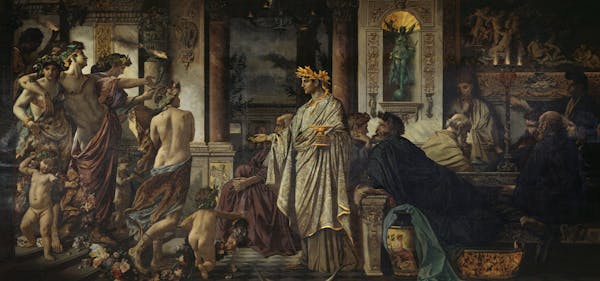by DAWN LAVALLE NORMON

As the philosopher and historian Xenophon tells the story, Socrates and his friends gathered around a classy sex worker, watching her as if she were a tableau, using her beautiful body to talk about other things that they care more about: desire, love, philosophy.
Then suddenly, the woman they are analysing joins the conversation. Theodote, a rich and beautiful courtesan, asks Socrates a question. Socrates gamely engages her in a witty conversation about the best way to increase desire. Socrates claims he wants to learn the skills of a courtesan in order to attract young men to join his life of philosophy.
While exchanging sexy philosophical chat with Theodote, Socrates had at least one wife of his own at home (possibly two at once). But his biographers never show him engaging his wives Xanthippe or Myrto in conversation. Instead, we see Xanthippe encumbered by a baby boy on her knee, sent away from Socrates’ deathbed in order for the philosophising to begin in earnest among the men.
Socrates can talk philosophically to Theodote and not to Xanthippe because the two women filled very different cultural roles in ancient Greece. Xanthippe’s respectable marriage – even to the controversial vagabond Socrates – placed her in a web of social obligations that prioritised her public silence and her physical obligations of caring for the family’s children and material wealth.
Theodote, on the other hand, made a living by being seductive, through her persuasive rhetoric and her adroitness at caring for her clients.
Her life, and those of women like her, depended on persuasion.
Participants in the world of thought
Sex workers in Ancient Greece divided into two somewhat overlapping types. The most common were those who lived in brothels, often enslaved sex workers providing a sanctioned service to the men of the ancient Greek city. The word for this role was porne, from where we get the English word pornography.
Not only did these women lack freedom, but their profession could also be dangerous. Women consigned to this life had no leisure and no expectation of education.
But there was another kind of sex worker who gripped the imagination of writers in the ancient world. These women did not live in brothels, but in their own homes. They granted favours, rather than being bought for a fee, and participated in the language of aristocratic exchange of goods.
They were called “friends”, hetairai in Greek, or, as they came to be known in English, courtesans.
These women were seen as having captivating minds, not just captivating bodies. They could be conversation partners and were allowed unprecedented freedom in the ancient world.
Theodote was one of these women. When Socrates sees her, she is sitting next to her “mother”: it was common for courtesans to form female social clusters using the language of family even when the relationship was not biological.
The Conversation for more
